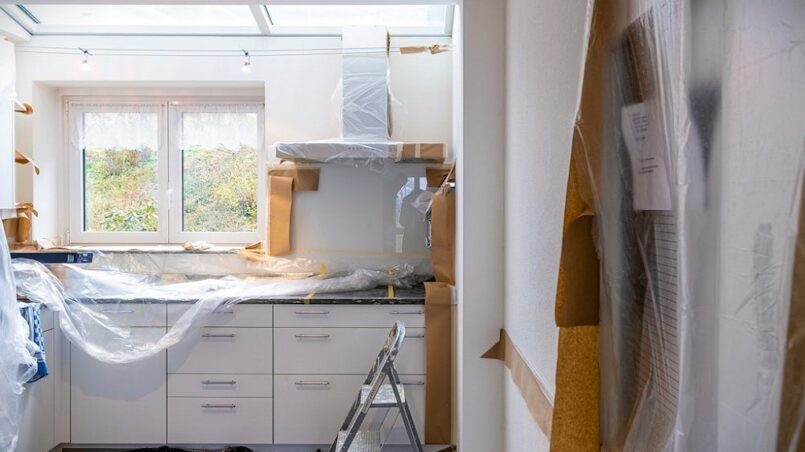A large-scale renovation is an exhilarating venture that promises to transform your living space into the home of your dreams. Such projects, whether they involve expanding your living area, overhauling your kitchen, or adding luxurious features, not only enhance the aesthetics and functionality of your home but can also significantly increase its market value. However, the path to a successful renovation is paved with careful planning and preparation. Without these, you might find yourself navigating through a maze of delays, budget overruns, and unmet expectations.
Budgeting emerges as a cornerstone of renovation planning. It’s the financial blueprint that guides your project from conception to completion. Consider this: according to HomeAdvisor, the average cost for kitchen remodels in Nashville falls between $14,559 and $40,533. This stark range underscores the variability and potential unpredictability of renovation costs, highlighting the importance of setting a realistic budget that accounts for both your aspirations and the inevitable surprises that large-scale projects entail. With that in mind, let’s delve into pivotal steps to prepare your house for the renovation.
1. Secure Your Belongings
Before the first hammer swings, it’s imperative to clear the battlefield. Renovation zones are bustling with activity, filled with contractors, bulky materials, and heavy machinery. In this chaos, your belongings stand vulnerable, susceptible to dust, damage, or even accidental disposal. Given this, it’s best to entrust your valuables to long distance movers in Nashville. Such professionals specialize in safely packing, moving, and storing your items, be it a cherished piano, antique furniture, or your entire home’s contents, away from the renovation frenzy.
Opting for long-distance movers is not merely about relocation but about ensuring the integrity of your belongings. These experts use specialized packing materials and techniques to protect your items, offering you peace of mind. Moreover, a clutter-free space is not just safer; it allows contractors to work more efficiently, potentially saving you time and money on the renovation. This step, though often overlooked, is a cornerstone of a smooth renovation process.
2. Create a Detailed Renovation Plan
Diving into renovations without a detailed plan is akin to setting sail without a map. A comprehensive renovation plan outlines the scope of work, design preferences, timelines, and expected outcomes, serving as a roadmap for both you and your contractors. This is the stage to dream big—think about how you want each space to look, function, and flow into the next. Consulting with architects or designers can bring valuable insights into your project, helping to avoid common pitfalls and ensuring your ideas are both practical and aesthetically pleasing.
A detailed plan also facilitates clear communication with your renovation team, minimizing misunderstandings and discrepancies. It should include technical drawings or 3D renderings, providing a visual representation of the final product. This clarity not only helps in achieving the desired outcome but also assists in managing expectations, ensuring that everyone involved has a shared vision of the project’s end goal.
3. Set a Realistic Budget
Budgeting for a renovation is not merely about allocating funds; it’s about understanding the financial landscape of your project and preparing for the unexpected. Renovations can vary widely in scope and scale. Establishing a realistic budget means carefully evaluating your needs versus wants, prioritizing spending on areas that offer the most significant impact or return on investment, and always including a contingency fund for unforeseen expenses.
Effective budgeting also involves getting multiple quotes from contractors, comparing prices for materials, and considering alternative solutions that can save money without compromising quality. Financing options, such as loans or refinancing, may also play a role in how you plan your budget. Remember, a well-thought-out budget is your best defense against cost overruns and financial stress, ensuring that your renovation project remains feasible from start to finish.
4. Choose the Right Contractor
Selecting the right contractor is paramount to the success of your renovation project. This decision can make the difference between a smoothly executed renovation and one fraught with challenges. Begin by conducting thorough research—seek recommendations from friends and family, read online reviews, and check out contractors’ past projects. It’s crucial to ensure they have experience with renovations similar to yours and a track record of satisfied clients.
When you’ve narrowed down your list, interview potential contractors to gauge their communication style, professionalism, and understanding of your project. Ask for detailed quotes to compare pricing and get a sense of how they manage budgeting and timelines. Ensure they are licensed, insured, and willing to provide a contract that clearly outlines the scope of work, timelines, payment schedules, and how they handle changes or unexpected issues. Choosing a contractor who aligns with your expectations and whom you trust can significantly affect your renovation experience.
5. Prepare for Disruption and Delays
Renovations, especially large-scale ones, can disrupt your daily routine more than you might anticipate. Living through a renovation means dealing with noise, dust, and sometimes the inconvenience of not having access to certain parts of your home. It’s essential to plan for these disruptions—consider setting up a temporary kitchen if yours is being remodeled or rearranging your living situation to accommodate the work being done.
Moreover, no matter how well you plan, delays can happen. Weather, supply chain issues, or unforeseen structural problems can extend timelines. It’s important to stay flexible and maintain open lines of communication with your contractor to navigate these challenges together. Adjusting your expectations and being prepared for the unexpected will help reduce stress and make the renovation process more bearable.
6. Keep Communication Open with Your Contractor
Effective communication with your contractor throughout the renovation process cannot be overstated. Regular check-ins and being available to make timely decisions are crucial for keeping the project on track. Don’t hesitate to raise concerns or ask questions; it’s better to address issues as they arise rather than after the project has progressed further.
A good contractor will be proactive in communicating with you, providing updates on progress, and discussing any changes or decisions that need to be made. This collaborative approach ensures that the project aligns with your vision and can help mitigate any potential issues before they become significant problems. Remember, the goal is a successful renovation that meets your expectations, and open, honest communication is key to achieving this.
Conclusion
Preparing your house for large-scale renovations requires thorough planning, careful budgeting, and a bit of flexibility. From securing your belongings with long distance movers in Nashville to choosing the right contractor and preparing for the inevitable disruptions, each step you take in preparation is a step toward a smoother renovation process. Remember, the goal of any renovation is to enhance your living space, increasing both its value and your enjoyment of it. By following these tips, you can navigate the complexities of renovation with confidence, ensuring that the final result is everything you’ve envisioned.



